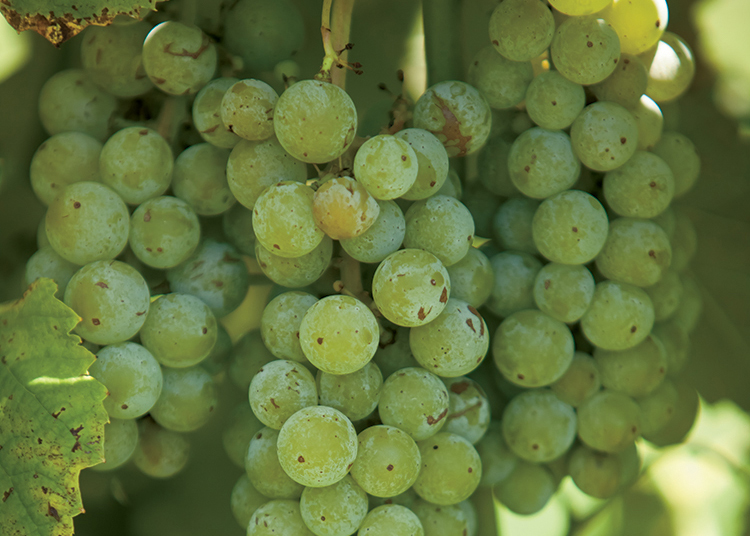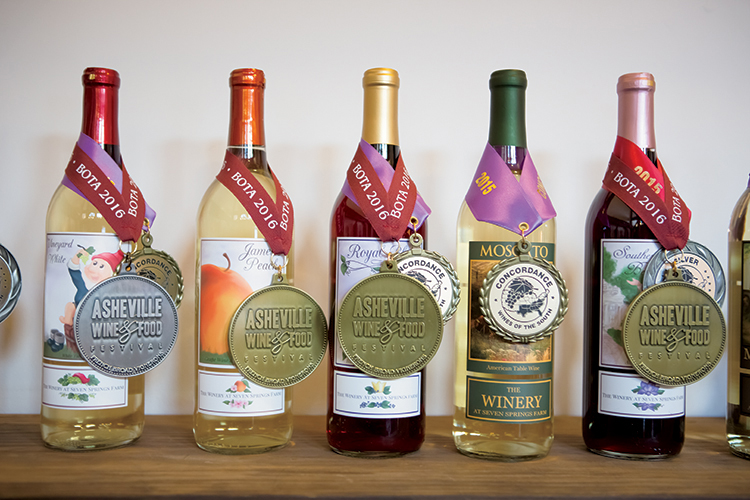Home > Tennessee > Tennessee Crops & Livestock > Tennessee’s Wine Industry Grows by the Year
Tennessee’s Wine Industry Grows by the Year
In partnership with: Tennessee Department of Agriculture

Raise a glass to Tennessee’s growing number of wineries. With more than 70 across the state, this sector is yet another bright spot in Tennessee agriculture, helping spark wine grape cultivation and agritourism.
Tennessee is no stranger to a thriving wine industry. In the 1800s, the state boasted
a substantial wine grape sector, and it was even one of the top wine-producing states in the nation. However, production saw a steep decline during Prohibition. It suffered until changes to state laws took hold in the 1970s, sparking a resurgence.
“The wine industry in Tennessee has grown over the years – and continues to grow,” says Nikki Riddle, vintner at The Winery at Seven Springs Farm in Maynardville. “We are changing people’s perception about the local wine industry by producing amazing wines.
“Also, legislative changes – self-distribution, wine in grocery stores, satellite sales facilities and being able to sell wine by the glass – have made it easier to run a profitable business, allowing more wineries to open up,” she adds.
Grape Expectations
The Winery at Seven Springs Farm produces a Heritage red wine and several varieties of white wine, including Moscato and Riesling. The Winery grows 6 acres of French-American hybrid grapes and American varietals, including Concord and Catawba, but also purchases grapes from local growers, which Riddle says provides jobs in these rural areas.
“The weather and pest pressure can make Tennessee a challenging place to grow grapes, but if you choose the right varietals, they will flourish. The rolling hillsides of East Tennessee allow for well-drained soil and provide the perfect location to plant the grapes,” Riddle says.
David Lockwood, UT Extension Fruit & Nut Crops Specialist, says the state’s geography offers an advantage for viticulturists.
“Tennessee is in a transition zone. We can grow pretty much what’s grown north of us and south of us within the state,” he says. “We can grow a fairly wide array of grape varieties and can make a lot of different types of wines. And, of course, we have a fair demand for fruit wines as well.”

Walt Chism, owner of Chisholm Vineyard in Arrington, grows 10 varieties of grapes and is a supplier of the fruit for Arrington Vineyards. He says grapes are an important crop for Tennessee because there is so much potential for the farmer to add value.
“Most of the crops that we raise we sell through another party, and then they process and sell it to the consumer,” he says. “The crop value, when you finish it out and turn it into wine, is probably nine to 10 times more than it is coming out of the field as grapes.”
Uncorking Opportunity
 Lockwood says another reason for the growing success of the wine industry is that it naturally ties in with agritourism, a boon for many operations.
Lockwood says another reason for the growing success of the wine industry is that it naturally ties in with agritourism, a boon for many operations.
“Wineries are allowed to offer tastings on-site, and it allows them to give visitors a real pleasant experience,” Lockwood says. “You can visit the farm to see the vineyards, see the wines being made and taste the different types of wines. It’s entertainment as well as an opportunity to get a really good wine.”
The Winery at Seven Springs Farm, for example, offers tastings and tours of the facility. It also hosts special events throughout the year.
Riddle’s father, James R. “Rick” Riddle, founded the Appalachian Region Wine Producers Association (ARWPA) and established the Great Valley Wine Trail in 2015. The trail received a grant to promote the wine and grape industry in the Nine Lakes region of East Tennessee.
In addition, an American Viticultural Area that recognizes the Appalachian High Country and Mississippi Delta as lying within parts of Tennessee and other states allows some state winemakers to market under a label that recognizes those defined grape-growing regions.
“A great aspect of the wine industry is that having multiple wineries in an area is beneficial,” Nikki Riddle says. “Wineries do not compete with each other, but rather promote each other. Many of us are in very rural areas and off the beaten path. The wine trail is a way to advertise and entice customers to each of our locations.
“Plus, it is another way that my father is supporting and promoting his children’s business and futures,” Riddle adds.
Tennessee wineries are listed at picktnproducts.org and available via the free Pick TN mobile app. The app provides GPS mapping capabilities to wineries across the state.



